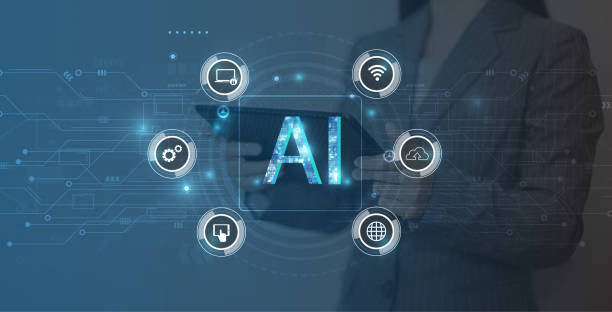What is Artificial Intelligence: Definition and Key Concepts

Artificial Intelligence (AI) is a branch of computer science that deals with building machines capable of performing tasks that typically require human intelligence.
These tasks include learning, problem-solving, pattern recognition, decision-making, and natural language understanding.
In fact, the main goal of #Artificial_Intelligence is to create systems that can think and act independently.
Key concepts in Artificial Intelligence include:
- Machine Learning : enables machines to learn from data and improve their performance without explicit programming.
- Neural Networks : computational models inspired by the structure of the human brain, used for pattern recognition and learning.
- Natural Language Processing (NLP) : enables machines to understand and generate human language.
- Computer Vision : enables machines to understand and interpret images and videos.
Artificial intelligence is currently used in many industries, including medicine, finance, transportation, and manufacturing.
The potential of AI to change the world is immense, but there are also concerns about its impact on employment and privacy.
Tired of losing business opportunities due to not having a professional corporate website? Don’t worry anymore! With Rasaweb’s corporate website design services:
✅ Your brand’s credibility and professionalism will increase.
✅ You will attract more customers and sales leads.
⚡ Get a free consultation right now to get started!
Types of Artificial Intelligence: Approaches and Classifications

Artificial intelligence can be categorized based on different capabilities and approaches.
Based on capabilities, artificial intelligence is divided into two main categories:
- Weak or Narrow AI : This type of AI is designed to perform a specific task and cannot perform other tasks.
Most existing AI systems currently fall into this category. - Strong or General AI : This type of AI is capable of performing any task that a human can do.
Strong AI is still in the developmental stages and does not yet exist.
Based on approaches, artificial intelligence is divided into several categories, including:
- Expert Systems : Systems that simulate the knowledge and experience of a human expert.
- Machine Learning: As explained previously, it enables machines to learn from data.
- Deep Learning : A type of machine learning that uses deep neural networks.
- Fuzzy Logic : An approach that enables machines to work with vague and imprecise concepts.
Each of these approaches has its own advantages and disadvantages and is suitable for different applications.
Applications of Artificial Intelligence in Various Industries

Artificial intelligence is widely used in various industries and is changing the way things are done.
Some important applications of artificial intelligence include:
- Medicine : Disease diagnosis, drug development, and patient care.
- Finance : Fraud detection, risk management, and algorithmic trading.
- Transportation : Self-driving cars, traffic management, and route optimization.
- Manufacturing : Production line automation, quality control, and predictive maintenance.
- Marketing : Targeted advertising, customer analytics, and chatbots.
These are just a few examples of artificial intelligence applications.
With technological advancements, AI is expected to be used in even more industries.
| Industry | Application |
|---|---|
| Medicine | Higher accuracy in disease diagnosis |
| Finance | Market trend prediction |
| Transportation | Autonomous driving |
Machine Learning and its Role in Artificial Intelligence

Machine learning is one of the most important subfields of Artificial Intelligence and plays a fundamental role in the development of intelligent systems.
Machine learning enables machines to learn from data and improve their performance without explicit programming.
This process involves feeding data to a machine learning algorithm and allowing the algorithm to find patterns and relationships in the data.
There are different types of machine learning algorithms, including:
- Supervised Learning : The algorithm is trained using labeled data (data for which the correct answer is known).
- Unsupervised Learning : The algorithm is trained using unlabeled data and must discover patterns independently.
- Reinforcement Learning : The algorithm is trained through interaction with an environment and receiving rewards or penalties.
Machine learning is used in many Artificial Intelligence applications, including image recognition, speech recognition, prediction, and recommender systems.
Does your company’s website perform as it deserves for your brand? In today’s competitive world, your website is your most important online tool. Rasaweb, a specialist in professional corporate website design, helps you to:
✅ Build credibility and trust with customers
✅ Convert website visitors into customers
⚡ Get a free consultation!
Challenges Facing Artificial Intelligence Development

Despite significant advances in Artificial Intelligence, many challenges still lie ahead for the development of this technology.
Some of these challenges include:
- Data scarcity: Many machine learning algorithms require a large volume of data to train effectively.
Collecting and labeling this data can be costly and time-consuming. - Interpretability: Understanding how deep learning algorithms make decisions can be difficult.
This can reduce trust in these systems and raise concerns about accountability. - Bias: Machine learning algorithms can learn and reinforce existing biases in training data.
This can lead to unfair or discriminatory outcomes. - Security: Artificial Intelligence systems can be vulnerable to cyberattacks.
These attacks can lead to data theft, manipulation of decisions, or even control of systems. - Ethical issues : The use of Artificial Intelligence raises important ethical questions, including privacy, accountability, and impact on employment.
Overcoming these challenges requires more research, the development of ethical standards, and international cooperation.
The Future of Artificial Intelligence: Opportunities and Threats

The future of Artificial Intelligence is bright and full of potential, but it also comes with challenges and threats.
Opportunities of Artificial Intelligence include:
- Improved productivity and efficiency: Artificial Intelligence can automate various processes and increase efficiency.
- Solving complex problems: Artificial Intelligence can help solve problems that are difficult or impossible for humans.
- Creation of new job opportunities: Artificial Intelligence can lead to the creation of new jobs in fields such as software development, data science, and robotics engineering.
- Improvement of quality of life: Artificial Intelligence can help improve the quality of life in areas such as medicine, education, and transportation.
Threats of Artificial Intelligence include:
- Job loss: Automation due to Artificial Intelligence can lead to job loss in some industries.
- Increased inequality: Artificial Intelligence can increase economic inequality, as people with the skills required to work with Artificial Intelligence will earn higher incomes.
- Threat to privacy: Artificial Intelligence can be used to collect and analyze personal data, which can threaten privacy.
- Security risks: Artificial Intelligence systems can be used for malicious purposes, such as cyberattacks or the creation of autonomous weapons.
To benefit from the opportunities of Artificial Intelligence and mitigate its threats, appropriate policymaking and education in the field of Artificial Intelligence are needed.
Ethical Considerations Around Artificial Intelligence and Its Use

With the widespread use of Artificial Intelligence, ethical considerations surrounding this technology are gaining more importance.
Important questions are raised regarding accountability, privacy, and fairness in the use of Artificial Intelligence.
Some of the most important ethical considerations include:
- Accountability : Who is responsible for the decisions and actions of Artificial Intelligence systems? If an Artificial Intelligence system causes harm, who will be held accountable?
- Privacy : How can individuals’ privacy be protected from the collection and use of personal data by Artificial Intelligence systems?
- Fairness : How can we ensure that Artificial Intelligence systems do not learn existing biases in data and do not create unfair or discriminatory results?
- Transparency : How can the decision-making process of Artificial Intelligence systems be made understandable to humans?
- Security: How can Artificial Intelligence systems be protected from misuse and cyberattacks?
To answer these questions and create ethical frameworks for the use of Artificial Intelligence, dialogue and cooperation between experts, policymakers, and the general public are needed.
| Ethical Issue | Description |
|---|---|
| Accountability | Identifying the individual or entity responsible for the performance of AI. |
| Transparency | Ensuring the comprehensibility of the AI decision-making process. |
| Privacy | Protecting individuals’ personal information from unauthorized access. |
The Role of Governments and Policymakers in Artificial Intelligence Development

Governments and policymakers play an important role in the responsible development and use of Artificial Intelligence.
By creating appropriate policies, they can leverage the opportunities of Artificial Intelligence and mitigate its threats.
Some of the important roles of governments and policymakers include:
- Investment in research and development: Governments can contribute to the advancement of Artificial Intelligence by investing in its research and development.
- Establishing ethical standards: Governments can prevent the misuse of Artificial Intelligence by establishing ethical standards for its use.
- Education and training: Governments can help individuals acquire the necessary skills to work with Artificial Intelligence by providing education and training in the field.
- Regulation: Governments can protect individuals’ privacy and prevent discrimination by establishing appropriate regulations for the use of Artificial Intelligence.
- International cooperation: Governments can facilitate the exchange of knowledge and experiences in the field of Artificial Intelligence through international cooperation.
By playing an active role, governments and policymakers can contribute to the responsible development and use of Artificial Intelligence and benefit society from its advantages.
Did you know a weak corporate website loses many opportunities for you daily? Solve this problem forever with a professional corporate website design by Rasaweb!
✅ Create a powerful and reliable image for your brand
✅ Targeted attraction of new customers and increased sales
⚡ [Get a free website design consultation]
Skills Required to Enter the World of Artificial Intelligence

Entering the world of Artificial Intelligence requires acquiring specific skills.
These skills include technical skills, analytical skills, and communication skills.
Some of the most important required skills include:
- Programming : Familiarity with programming languages such as Python and R is essential for developing Artificial Intelligence systems.
- Mathematics : Understanding mathematical concepts such as linear algebra, statistics, and probability is essential for machine learning and deep learning.
- Machine Learning: Familiarity with machine learning algorithms and how to use them to solve various problems is essential.
- Deep Learning: Understanding deep neural networks and how to train them for image recognition, speech recognition, and natural language processing is essential.
- Natural Language Processing: Familiarity with natural language processing methods is essential for building systems that can understand and generate human language.
- Analytical skills: The ability to analyze data and extract useful information from it to solve various problems is essential.
- Communication skills: The ability to communicate effectively with others and present ideas and results clearly and understandably is essential.
By acquiring these skills, you can enter the world of Artificial Intelligence and work in this field.
Artificial Intelligence Learning Resources: Books, Courses, and Useful Tools

Various resources are available for learning Artificial Intelligence.
These resources include books, courses, and useful tools.
Some useful resources for learning Artificial Intelligence include:
- Books : Many books are available on Artificial Intelligence that fully explain various concepts and methods.
- Courses : Many online and in-person courses on Artificial Intelligence are offered by universities, educational institutions, and technology companies.
- Tools : Various tools are available for developing Artificial Intelligence systems, such as TensorFlow, PyTorch, and scikit-learn.
- Scientific articles : Scientific articles published in reputable conferences and journals contain the latest research and findings in the field of Artificial Intelligence.
- Online forums and communities: Many online forums and communities exist where you can connect with other Artificial Intelligence enthusiasts and learn from their experiences.
By using these resources, you can increase your knowledge and skills in the field of Artificial Intelligence and progress in this area.
Frequently Asked Questions
| Question | Answer |
|---|---|
| 1. What is Artificial Intelligence (AI)? | It is a branch of computer science that aims to create machines capable of simulating human intelligence and performing tasks that require human thinking, such as learning, problem-solving, and decision-making. |
| 2. What are the main types of Artificial Intelligence? | They can be classified into Narrow AI (focused on a specific task), General AI (possessing comprehensive human capabilities), and Super AI (exceeding human intelligence). |
| 3. Mention some common Artificial Intelligence applications in our daily lives. | These include voice assistants (like Siri and Alexa), recommendation systems (like Netflix and Amazon), self-driving cars, facial recognition systems, and spam filters. |
| 4. What is the difference between Artificial Intelligence and Machine Learning? | Artificial intelligence is the broader concept of creating intelligent machines, while machine learning is a subset of artificial intelligence that focuses on enabling systems to learn from data without explicit programming. |
| 5. What is Deep Learning? | It is a subset of machine learning that uses multi-layered artificial neural networks (deep neural networks) to process data and detect complex patterns, and is used in image and speech recognition. |
| 6. What are the most prominent benefits of Artificial Intelligence? | Improving efficiency and productivity, automating repetitive tasks, making better decisions based on big data analysis, and developing solutions for complex problems in fields such as medicine and science. |
| 7. What are the main challenges facing the development and deployment of Artificial Intelligence? | These include the need for vast amounts of high-quality data, privacy and security issues, bias in data and algorithms, and high development and maintenance costs. |
| 8. Does Artificial Intelligence raise ethical or social concerns? | Yes, it raises concerns related to privacy, algorithmic bias, job displacement due to automation, responsibility for errors made by intelligent systems, and the need for a regulatory framework. |
| 9. How can Artificial Intelligence affect the future of the job market? | It can lead to the automation of some routine jobs, but it will also create new jobs requiring advanced skills in developing, operating, and maintaining AI systems. |
| 10. What are some modern or promising technologies in the field of Artificial Intelligence? | These include advanced Natural Language Processing (NLP) (such as large language models like ChatGPT), computer vision, robotics, and Generative AI. |
And other advertising agency services by Rasaweb in the field of advertising
Smart Direct Marketing: A fast and efficient solution for user engagement with a focus on SEO-driven content strategy.
Smart Content Strategy: A combination of creativity and technology to attract customers by using real data.
Smart UI/UX: Transform sales growth by optimizing key pages.
Smart Direct Marketing: An innovative service for increasing digital branding through optimizing key pages.
Smart Google Ads: Revolutionize website traffic by managing Google advertising.
And hundreds of other services in internet advertising, advertising consultation, and organizational solutions
Internet Advertising | Advertising Strategy | Sponsored Content
Resources
Applications of AI in Iranian Industry
AI Challenges and Solutions
The Future of AI and its Impacts
Artificial Intelligence on Persian Wikipedia
? Transform your business’s online presence with Rasaweb Afarin Digital Marketing Agency. From professional e-commerce website design to comprehensive digital strategies, we are your guide to success in the online world.
📍 Tehran, Mirdamad Street, next to Bank Markazi, Southern Kazeroon Alley, Ramin Alley, No. 6




